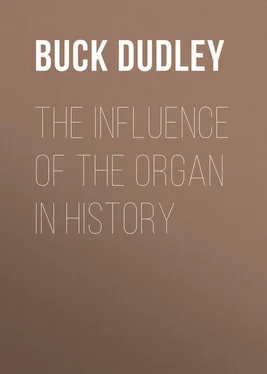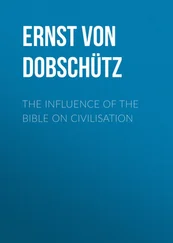Dudley Buck - The Influence of the Organ in History
Здесь есть возможность читать онлайн «Dudley Buck - The Influence of the Organ in History» — ознакомительный отрывок электронной книги совершенно бесплатно, а после прочтения отрывка купить полную версию. В некоторых случаях можно слушать аудио, скачать через торрент в формате fb2 и присутствует краткое содержание. Жанр: foreign_antique, foreign_prose, Историческая проза, на английском языке. Описание произведения, (предисловие) а так же отзывы посетителей доступны на портале библиотеки ЛибКат.
- Название:The Influence of the Organ in History
- Автор:
- Жанр:
- Год:неизвестен
- ISBN:нет данных
- Рейтинг книги:4 / 5. Голосов: 1
-
Избранное:Добавить в избранное
- Отзывы:
-
Ваша оценка:
- 80
- 1
- 2
- 3
- 4
- 5
The Influence of the Organ in History: краткое содержание, описание и аннотация
Предлагаем к чтению аннотацию, описание, краткое содержание или предисловие (зависит от того, что написал сам автор книги «The Influence of the Organ in History»). Если вы не нашли необходимую информацию о книге — напишите в комментариях, мы постараемся отыскать её.
The Influence of the Organ in History — читать онлайн ознакомительный отрывок
Ниже представлен текст книги, разбитый по страницам. Система сохранения места последней прочитанной страницы, позволяет с удобством читать онлайн бесплатно книгу «The Influence of the Organ in History», без необходимости каждый раз заново искать на чём Вы остановились. Поставьте закладку, и сможете в любой момент перейти на страницу, на которой закончили чтение.
Интервал:
Закладка:
In spite of the disrepute into which the whole monastic system fell, there is no question but that the monks and friars were the great conservators and preservers of all the fine arts, and even mechanics, during the troubled times of the Middle Ages. As the prejudice against the employment of instrumental music in the church services began to disappear, nothing was more natural than that the monks, having both the leisure and pecuniary means, and containing among their number the best educated men of the day, should turn their attention to organ-building, animated by the same spirit which led them to decorate and ornament their churches and monasteries. Thus we find that it is to them we owe the improvement of the hitherto clumsy key-board, extending its compass both upward and downward to the extent of some three octaves, and so reduced both fall and breadth of the keys that they could be pressed down by the fingers, instead of struck by the fist; certainly no small improvement. The first organ possessing keys to give the chromatic tones or semitones was built by a priest – Nicholas Faber by name – about 1360.
It now behoves us to glance for a moment at the influence which the organ already began to exert upon music, or the art composition, and to show how the instrument became to show proofs of that right to the title, "king of instruments," in the sense I have adopted. It must be kept in mind that the veriest twilight dawn of the knowledge of harmony had scarcely begun. Yet what can be conceived more natural, than that the organist of that day, even, should stumble on the fact that different tones in conjunction were more agreeable to the ear than the bare unison, which was at first the only accompaniment of the choral song? This being noted, the next logical step was to try and produce the same approved effect with the voices themselves. In the " History of the Modern Music of Western Europe ," by Kiesewetter , the following passage occurs. He is not speaking of the organ, but of the origin and development of the science of harmony.
He says: "The union of different human voices which now occurred to their thoughts (the early harmonists), was an imitation not altogether happy, perhaps, of that which in various instances they had discovered with the organ !" Here the fact that the organ was even then beginning to assert itself, to mould the minds of the early writers, in fact, to claim its royal dues, is pretty conclusively shown.
Time would altogether fail me in the scope that this lecture must necessarily occupy, to trace down this influence, once established, through the long cycle of years that followed; the theoretic science and practical application keeping pace with the mechanical development, until it found its full culmination and glory in the new-born science of Counterpoint. This science, which has given polish to the mightiest thoughts of the greatest masters of our art (and in totally different departments than mere organ-playing), – a science, without a satisfactory knowledge of which no man can call himself a thoroughly educated musician, – sprang from just this source.
How often we hear the remark that contrapuntal treatment is best suited to the organ! True; but how many reflect that the organ, so to speak, first dictated counterpoint to the world? An influence, which (the free forms being derived from the stricter) is carried clear down into the realm of Italian opera, i. e. , when it is good of its kind. Is not, then, this influence, which the organ has indisputably exerted upon not merely its own literature, but the musical literature at large, an all-sufficient proof of its right to the royal title? It must be borne in mind that this absolutism, as in matters political (to carry out the simile), was possible at this stage of the world in matters musical, because not even the harpsichord, clavichord, spinet, or any of those presentiments of the modern pianoforte, by whatever name they were called, had as yet made their appearance. The organ was, for the time, the sole keyed instrument.
In view of these facts, it seems to me that it may be justly claimed that the title "king of instruments" should be based on far nobler and more historic grounds than is usually done, and that we should not content ourselves with explaining this phrase as arising from the circumstances that it is the instrument which can, of its own resources, make the loudest noise!
SECTION II
The organ nomenclature has, as is the way of the world, changed somewhat from age to age. In accounts of the old English organ, we frequently find this and that church being referred to as possessing a "payre of organs." This has been variously interpreted, some supposing it to refer to organs of two manuals, which explanation seems natural enough; but the best authorities explain it as meaning an organ which possesses more than one rank of pipes, or more than one stop. Rimbault, who takes this view, says the expression is to be regarded as a phrase of nearly obsolete English, and to be taken in the same sense as we still sometimes say "a pair of stairs," instead of a "flight of stairs." One proof of this interpretation that he cites is interesting. During the great Cromwellian rebellion, and the rule of the Roundheads in England, a great many organs were destroyed by the soldiery, who considered them a relic of Popery. At this time, a certain Mr. Pepys, whose diary is still extant, travelled about considerably and interested himself in the organ, as well as some other matters, as will be seen from the following extract from the aforesaid diary. The point to us (although by no means the only one to him) lies in the fact that he uses the words "the organ" and the "pair of organs" as evidently, synonymous. He writes as follows: —
April 5, 1667. " To Hackney: where good beef tongue, and things to eat and drink, and very merry, the weather being mighty pleasant; and here I was told, that at their church they have a fair PAIR OF ORGANS, which play while the people sing, which I am mighty glad of wishing the like at our church at London, and would give £50 towards it. "
April 21, 1667. " To Hackney church, where very full, and found much difficulty to get pews. I offered the sexton money, and he could not help me… That which I chiefly went to see was the young ladies of the schools, whereof there is great store, very pretty" (you see how history repeats itself); "and ALSO the ORGAN, which is handsome and tunes the psalms, and plays with the people; which is mighty pretty, and makes me mighty earnest to have a pair at our church, I having almost a mind to give them a pair, if they would settle a maintenance on them for it. "
Читать дальшеИнтервал:
Закладка:
Похожие книги на «The Influence of the Organ in History»
Представляем Вашему вниманию похожие книги на «The Influence of the Organ in History» списком для выбора. Мы отобрали схожую по названию и смыслу литературу в надежде предоставить читателям больше вариантов отыскать новые, интересные, ещё непрочитанные произведения.
Обсуждение, отзывы о книге «The Influence of the Organ in History» и просто собственные мнения читателей. Оставьте ваши комментарии, напишите, что Вы думаете о произведении, его смысле или главных героях. Укажите что конкретно понравилось, а что нет, и почему Вы так считаете.












